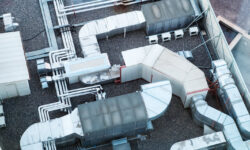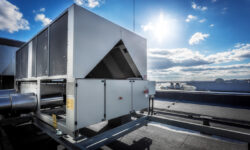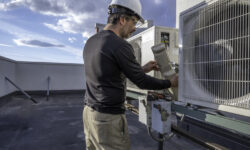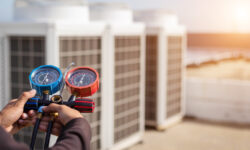While it’s economical and responsible to keep appliances alive as long as you can, they have a finite span. Eventually, repairs won’t do any good and replacement will be the only option. You may be facing the difficult decision to replace your commercial furnace, for instance. Can it stand one more repair? Will you be able to get another year of use? Let’s take a look at the signs that a commercial furnace replacement is in your future.
Read more →The United States Department of Energy has a multitude of different responsibilities, but the organization’s primary responsibilities involve managing the nation’s nuclear infrastructure. As ONE of its many responsibilities, the DOE also creates efficiency standards for HVAC equipment. The newest set of standards, 2023 DOE Efficiency Standards, become effective January 1, 2023. These 2023 DOE Efficiency Standards are based on research conducted by independent entities. The DOE and other organizations provide these researchers with funding so that they can explore ways to optimize energy consumption. DOE standards primarily apply to HVAC equipment manufacturers and installers. However, they can also impact your business in several ways. By voluntarily adhering to these standards, you can save money and improve energy efficiency. Additionally, you may be able to access tax credits by designing a system that complies with 2023 standards. Join us as we examine the latest set of 2023 DOE standards and what they mean for your business.
Read more →Your building’s HVAC system and its energy use represent a significant cost to your business. If your system wastes energy, that’s money down the drain. The International Energy Agency says that AC alone accounts for 20% of electricity use in buildings today and that we need to improve that value in the future. There are many potential causes of energy inefficiency in HVAC systems. You can watch for these signs to determine whether your HVAC system is wasting energy and take action to improve it.
Read more →Keeping your commercial HVAC system in working order provides a wide range of benefits. The Department of Energy highlights the need for a proper HVAC system to conserve energy and ensure air quality. You can watch for these signs to tell when you’re dealing with a failing HVAC system.
Read more →It’s essential to know the air conditioning in your building ties directly to its air quality. Discovering mold in ACs can be concerning for facility managers. When mold is left to spread, it can create serious health problems for your employees or clients. If you’ve found mold in your air conditioner, it’s essential to act quickly. Here are how an expert deciphers whether air conditioners have mold.
Read more →HVAC technicians are tasked with an essential duty: keeping properties and buildings at safe and comfortable temperatures. But their line of work could land them in situations where they endure the summer heat for hours — and it’s up to facility managers to ensure the proper working conditions for technicians who come on-site. Here are some practical tips you can bear in mind for optimal HVAC technician safety while on the job and use to ensure that your facility is a welcoming environment for the team that services your HVAC equipment.
Read more →The best way to avoid HVAC building maintenance problems is to schedule a seasonal inspection and tune-up. This type of routine service will help keep your commercial system running efficiently all year round. It will also give the HVAC technician an opportunity to identify problems earlier, which will make it easier to conduct repairs. It’s also important to keep aware of developing problems. Here are a few common commercial HVAC issues to look for throughout the year.
Read more →As a commercial HVAC contractor, we focus solely on servicing the heating and cooling systems for businesses and industrial businesses. This allows us to ensure each of our technicians has the specialized experience and skills necessary to work with larger cooling systems. Read on to discover some of the reasons we focus on commercial HVAC equipment.
Read more →Your heating and cooling system may not be the most glamorous part of your building, but when it stops working, it’s definitely the most important! Annual air conditioner maintenance can ensure that you don’t have big, expensive emergency repairs when the temperatures soar. There are four key reasons you should never skip your commercial annual air conditioner maintenance.
Read more →When your property’s heating or cooling system breaks down, you’ll need a reliable HVAC contractor to fix the issue immediately. HVAC failures and inefficiencies can be detrimental to your commercial property. For example, an AC breakdown during a hot summer day means that your tenants will face uncomfortable temperatures. Furthermore, energy inefficiencies in your HVAC system mean that your monthly utility bills will be higher than usual. Fortunately, many trustworthy HVAC contractors are available around the clock to find the source problem in your HVAC system and offer the best solution. However, not every local HVAC team will provide quality services. Given this concern, let’s discuss how to find the best HVAC experts for your commercial property.
Read more →









